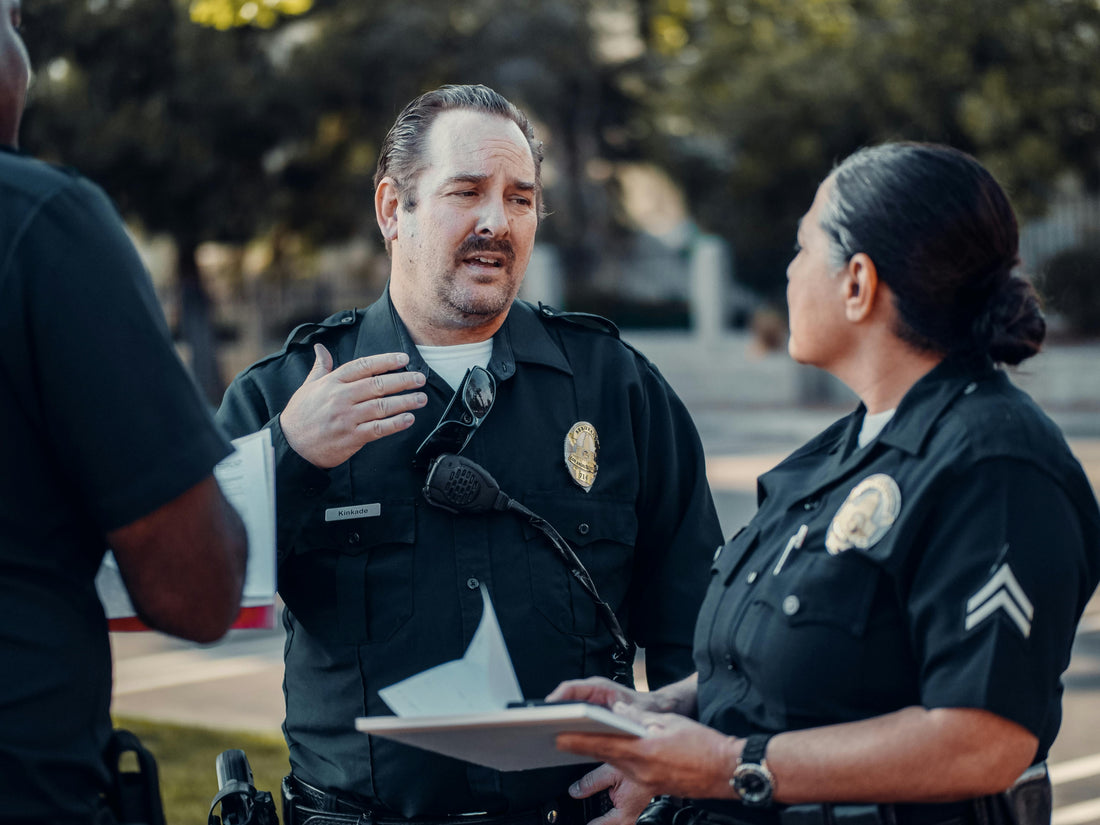Kids are often captivated by police officers, seeing them as real-life superheroes. These "good guys" keep everyone safe and catch criminals, perfectly aligning with a child's natural desire for security and their early grasp of right and wrong. Plus, officers are a visible part of our communities. Simple, positive interaction, like a wave or a quick peek inside a patrol car at a school even, can leave a lasting impression and spark a child's curiosity. Here are some fun facts about police officers that kids will find interesting.

Everything Kids Want to Know About Police Officers
The visual aspects of police work- from uniforms and badges to flashing lights and sirens- are highly exciting for kids and frequently seen in children's books and action movies. All the stimulating sights and sounds fuel their imaginative play, allowing them to act out thrilling scenarios like chasing "bad guys" or solving mysteries. Kids will be especially interested in learning all about police cars and how they are equipped. Beyond play, learning about police officers helps children understand rules and laws, showing them how communities stay organized and safe. Continue reading to learn fascinating facts about the important work police officers perform on a daily basis.
Police Officer Trivia That Will Blow Kids Away
The appeal of police officers to young children is undeniable. Kids view them as the "good guys" who keep everyone safe and catch criminals, a perfect fit for their natural desire for security and their early understanding of right versus wrong. They frequently see officers as real-life superheroes, ready to protect and serve. This fascination is undeniably boosted by the visual excitement of police work: from the sharp uniforms and gleaming badges to the thrilling flashing lights and sirens of patrol cars and even police dogs. Police officers serve as a clear example of adult authority who help them make sense of the world around them. Here are some facts about police officers to share with kids who are thinking about their own futures.

(1) All officers must successfully complete police academy.
Even with an academic background, everyone hired by a police department must successfully complete a police academy. This isn't optional; it's a mandatory, intensive training program, usually lasting several months. At the academy, recruits gain the essential practical skills and knowledge needed for the job. This includes crucial areas like legal procedures, firearms training and safety, self-defense, first aid, emergency vehicle operation, and crime scene processing.
(2) There are more than 1.2 million police officers in the United States.
It's important to remember that this figure includes officers from all levels of government. This means it covers local police departments, sheriff's offices, state police and highway patrol, and federal law enforcement agencies like the FBI, DEA, and Secret Service.
(3) Police work is physically dangerous for a variety of reasons.
The dangers of police work are undeniable. Officers routinely face individuals who are armed, desperate, or hostile. Fatalities frequently result from gunfire, but the threats officers encounter are diverse, ranging from knives and blunt objects to vehicles used as weapons. Beyond these direct confrontations, the physical demands of arresting and subduing suspects commonly lead to injuries such as sprains, strains, and even broken bones.
(4) Police officers endure extreme psychological stress.
Police work is profoundly and uniquely stressful, placing significant psychological burdens on law enforcement officers. They confront a constant barrage of both immediate and accumulating stressors, leading to substantial mental health challenges. Officers routinely witness traumatic events that most individuals will never encounter, such as homicides, horrific traffic fatalities, mass shootings, child abuse, and other violent crimes. This inherent danger of the profession forces officers into a perpetual state of hypervigilance to protect themselves and others. While crucial for the job, this sustained alertness can result in chronic stress, anxiety, disturbed sleep, and an inability to fully decompress even when off duty.
(5) Male officers comprise 85% of the police force in the United States.
Men overwhelmingly dominate police forces, creating a significant gender disparity among officers. Although the proportion of women in policing has slowly risen, it still falls far short of their presence in the general population. Initiatives are underway to boost female representation to 30%.
(6) The minimum degree required to become a police officer is a high school diploma or GED.
Many local and state police departments favor candidates with some college education, such as an Associate's degree or specific college credits. While not always mandatory for initial hire, a Bachelor's or Master's degree can significantly boost your chances for entry-level roles and is often a prerequisite for advancing to supervisory, administrative, or specialized positions like detective. Notably, federal law enforcement agencies— including the FBI, DEA, and Secret Service— almost universally require a Bachelor's degree.
(7) Death in the line of duty, while not common, is a real possibility.
The number of U.S. police officers killed in the line of duty fluctuates annually, with recent data indicating a consistent rise. As of 2024, 147 federal, state, county, municipal, military, tribal, and campus officers have died, marking a 25% increase from 2023. The primary causes of these fatalities are firearms and traffic-related incidents.
(8) There are many different slang terms for police.
Cop: The most widely used and generally neutral term for a police officer.
The Fuzz: An older, more informal slang term for police.
The Boys in Blue: A more traditional and complimentary term for police officers.
Five-Oh (5-O): Originating from the TV show "Hawaii Five-O," this term is often used by civilians and can sometimes carry a negative connotation.
Po-Po: An informal term, sometimes used humorously or derisively.
Johnny Law: This term emerged as an attempt to personify law enforcement, with "Johnny" being a stereotypical male name (similar to "John Doe").

More Facts About Professions Kids Will Find Interesting
It's never too soon to introduce kids to all sorts of professions and what it takes to succeed in these careers. Here are some fun lists detailing things you never knew about the work it takes to be successful.






